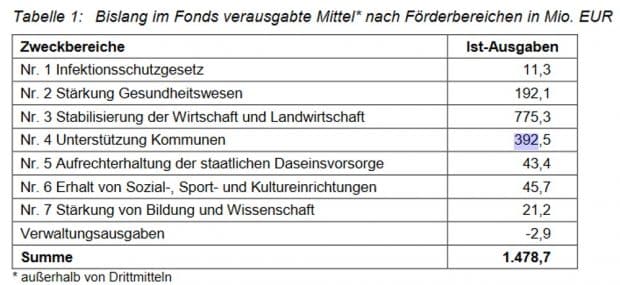On Friday, July 30th, SPD general secretary Henning Homann drew attention to the fact that Saxony is steering right into a financial overload, because the repayment period of eight years stipulated in the constitution also means that the 6 billion just approved by the state parliament Euro Corona aid will already add up in the next few households with huge repayment sums.In 2013 the SPD parliamentary group in the state parliament at least had stomach ache when deciding to write the debt brake into the constitution in this way and let the members vote before they said “yes”.
But their majority decision also tells of the fact that even convinced social democrats are not in a position to understand the consequences of such a fiscal policy, of all things, in the event of a crisis.
Because then a tax-financed Free State turns into a debtor who already has less money in the cash register anyway (because the tax income is falling due to Corona) and then has to shell out hundreds of millions of euros in loan repayments. Where do you get it from when the rulers in Germany even want to lower the taxes of the rich and wealthy?
Actually a ludicrous situation, as Nico Brünler, spokesman for the left-wing parliamentary group for budgetary and financial policy, commented on Sunday, August 1st. Even if he rightly has the feeling that the conservative majority in the state parliament does not really understand what the repayment periods in the constitution actually mean.
That is why the left-wing parliamentary group has now requested the state government with a motion (Printed matter 7/7337) to submit an opinion on the consequences of the debt brake in Saxony to the state parliament by the end of November 2021. In doing so, it should commission a professionally suitable and sufficiently independent institution. In particular, the aim is to examine the consequences of different repayment periods for corona loans and the resulting expenditures for the economy, the education system, the welfare state, the infrastructure or the health system.
“On April 9, 2020, the state parliament authorized the state government to take out loans of up to six billion euros – this is intended to cope with the emergency situation in our country as a result of the corona pandemic. Article 95 of the state constitution determines both the ban on new borrowing and the exemptions, but above all it stipulates that the loans are to be repaid within eight years, ”says Nico Brünler, referring to the problem created by the state parliament itself in 2013.
“This clause is now proving to be an enormous threat to the Free State’s ability to act. In particular, necessary investments in social affairs, health and infrastructure would have to be avoided if the requirement is implemented. “
And Saxony is only just beginning to borrow.
“We expect that this credit line will be fully used. For repayment, 750 million euros would have to be withdrawn from the state budget from 2023 onwards if the 8-year rule remains in place, ”said Brünler.
“The loans already taken out in 2020 amounting to a good 1.75 billion euros are already causing a repayment obligation of almost 300 million euros per year. That is more than double what the Free State has invested annually in the educational infrastructure of kindergartens and schools! With the cuts that would then be necessary, Saxony would not get out of the crisis, but would plunge straight into new crises. “
On June 21, Finance Minister Hartmut Vorjohann reported on the funds already sufficient to cope with the corona crisis in 2020. According to his report, 1.478 billion euros were paid out from the Corona provision fund in 2020 – Most of it, 775 million euros, to stabilize the economy and agriculture. 392 million euros went to strengthen the municipalities, all of which are struggling with massive tax shortfalls. 192 million euros flowed into the health care system, 45 million euros into saving culture.

But that also means that the entire 1.755 billion euros that the Free State raised on the credit market on the basis of the state parliament’s resolution were not spent.
Nevertheless, the Free State must if the state parliament Article 95 of the state constitution does not change, repay the loans taken out “within eight years at the latest”.
And with his report for 2020, Vorjohann has already listed how this will happen. Because from 2023 he has already calculated the repayment obligations for the 1.755 billion euros that have already been borrowed: just under 292 million euros. Every year from 2023 to 2028. And the upcoming obligations for the outstanding loans are not yet included.
Because the Free State can borrow up to 6 billion euros to cushion the consequences of the corona. And that, while at the same time he is missing around 1 billion euros in tax revenue per year due to the pandemic. Where are the repayment installments supposed to come from if you don’t want to intervene massively in the budget?
And all of this without any external coercion. Other federal states work with repayment periods of up to 30 years, knowing full well that in the midst of dealing with the crisis, one must not also cut budgets.
“For us it is clear: The state constitution must be changed so that there is more time for the repayment,” says Brünler.
“The 8-year rule has to be removed so that Saxony can grow out of its debts. The state government should now have an independent analysis of the damage that otherwise threatens. In addition, it should initiate a social debate in which not only municipalities, trade unions, science, churches, business and civil society associations participate. The question is: is the debt brake still appropriate? We say: No. “
The debt brake was already out of date in 2013. It is nothing more than an alibi for a wrong tax policy, which already resulted in underfunded municipalities and state budgets, while the wealthy in Germany were given low tax rates.
Note from the editors on their own account
We have opened our archive to all readers since the “corona crisis”. Since then, non-subscribers have also been able to discover all the articles from the last few years on L-IZ.de. In addition to the daily reports, without any paywall.
Support local / regional journalism and thus our daily work on site in Leipzig. With the conclusion of a free buyer subscription (to the subscriber page) you secure daily, freely available access to important information in Leipzig and our work for you.
Thanks a lot for this.
–


